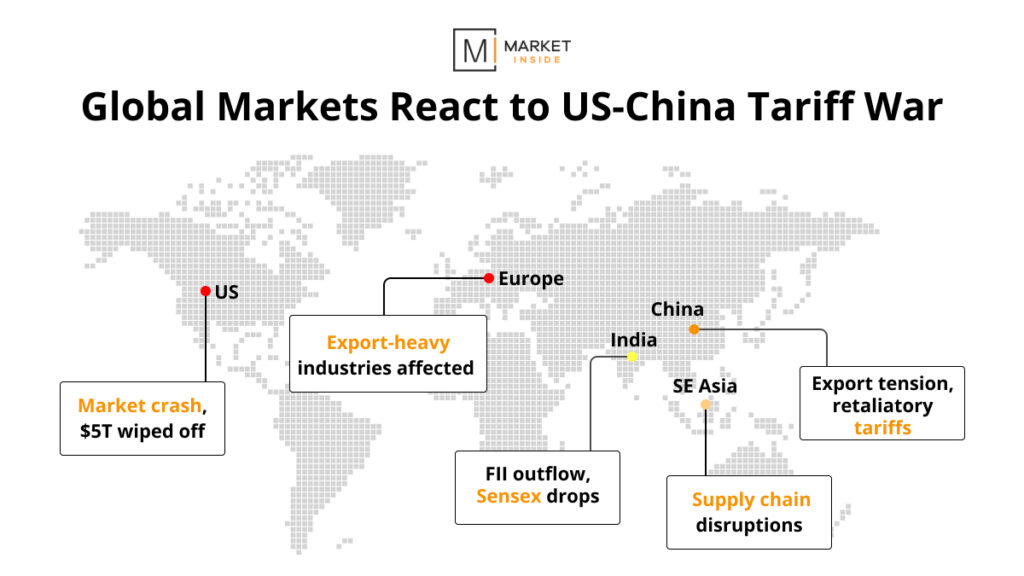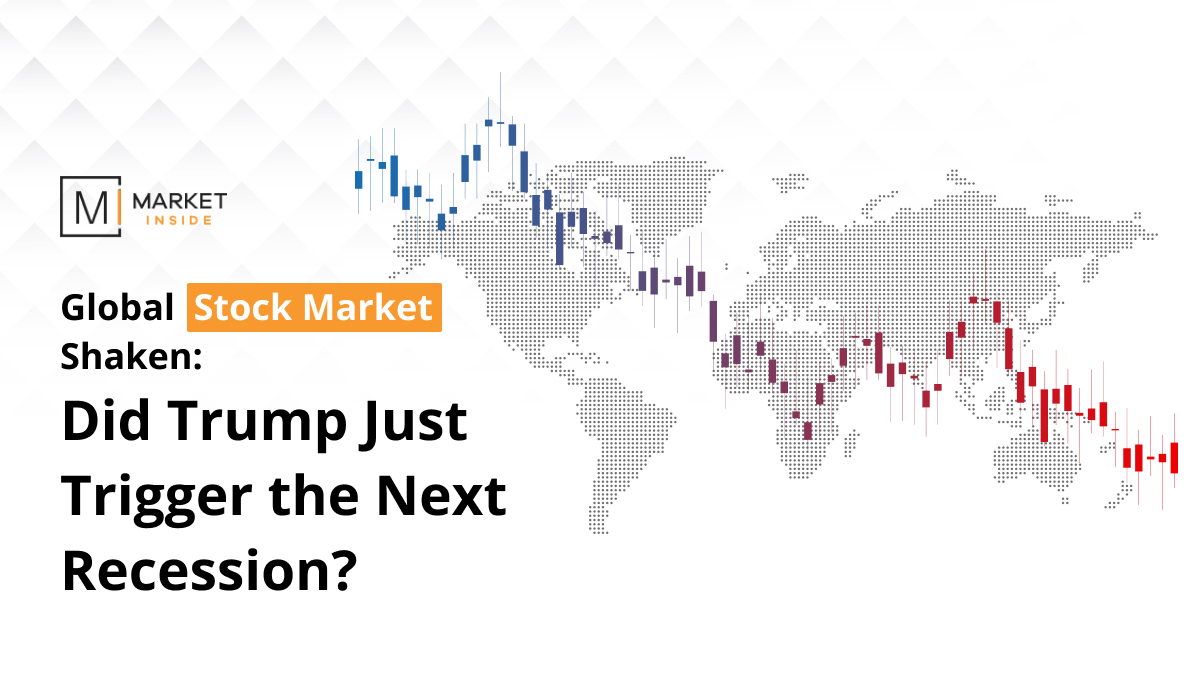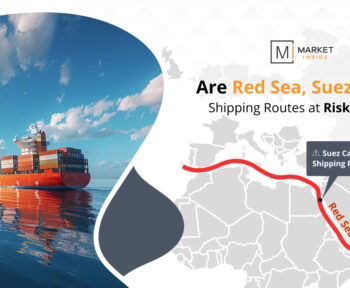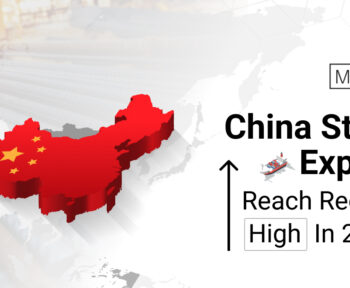The global trade market has recently experienced significant turbulence, majorly affecting stock markets worldwide. The sudden implementation of heavy tariffs by the US under the presidency of Donald Trump has triggered panic throughout the world. What earlier looked like a policy decision has now turned into a trade war.
According to a report published by Bloomberg quoting JPMorgan Chase & Co chief US economist, Michael Feroli said that “The forecasted contraction in economic activity is expected to depress hiring over time to lift the unemployment rate to 5.3%.”
Let us break down into what’s really happening and what it could mean for the future.
Trump’s Tariff Announcement and China’s Response
On 2nd of April 2025, US President Donald Trump announced to implement a 10% baseline tariff on all imports, while separate rates were announced for trading partners. And in response to this, China on April 4th announced to impose an additional 34% tariff on US imports, waging a silent trade war.
US Market Reaction Post China’s Announcement:
The American stock market showed a significant fall, immediately after China hit back with its own tariffs, in response to the US decision.
The S&P 500, one of the key drivers of the US market, fell by 6%. This huge decline turned out to be the worst week for the S&P 500 since March 2020, when COVID-19 had first hit the global economy.
Dow Jones, yet another major stock index that hit-falling by 2,231 points, that is about 5.5% in just a week. That’s a massive single-week fall.
At the same time, the Nasdaq, which tracks many tech companies, fell by 5.8%. This drop pushed it over 20% below its record high from December, meaning it officially entered what’s known as a “bear market” a sign of long-term decline.
In total, the US stock market has now lost over $5 trillion in value during Trump’s tariff war. That’s an enormous amount of money wiped out, showing just how serious the market reaction has been.

How Did the Other Markets React?
Shockwaves Across the Globe
The panic wasn’t limited to the US. Markets in Europe and Asia also tumbled. Tech stocks, car makers, and exporters were among the hardest hit – the industries that rely heavily on global trade.
Reasons behind the Fall of Stock Market
The US stock market is going through a challenging phase, where its major indicators like S&P 500 and Dow Jones are dropping at a rapid pace. It’s like a big financial storm has hit the entire world, shaking up the confidence of the investors across the board.
Here are the five big reasons behind this market crash:
1. Trade Tensions Between the U.S. and China
The US government recently announced new tariffs on Chinese imports. In response to which, the Chinese government hit back with their own tariffs on American goods. This to-and-fro if tariff rates has sparked a full-blown trade war, causing panic among investors. People are worried that these growing tensions could last long.
2. Rising Fears of a Recession
There is a growing fear that the US economy might slow down or even fall into depression due to the trade war. When countries undergo trade tensions, it affects the business growth, shrinks company profits and leads to increased unemployment. All of these pressurizes the economy and the stock market.
3. Inflation Pressures
Despite market downturns, inflation remains a pressing issue. The Federal Reserve faces the challenge of balancing interest rates to control inflation without further hampering economic growth. This delicate balancing act adds to market uncertainties.
Federal Reserve Chair Jerome Powell indicated that a trade war may cause more damage than expected, including higher inflation and slower growth. He said “We face a highly uncertain outlook with elevated risks of both higher unemployment and higher inflation”.
4. Global Market Declines
The US China trade dispute is not just hurting their own economies but shaking up the entire world. The stock markets in Asia and Europe too faced a major stock market shock due to it. The reason behind it is that, today, since the world is so globally interlinked, that when two major economies clash, everyone feels the jolt. And more importantly the industries that rely on international trade like technology, automobiles, exports etc. are being affected the most.
5. Investor’s Step to Safety
Today, many of the investors are no longer willing to take any more risks due to underlying uncertainty in the market. So, instead of investing in stocks, they are utilizing money to trade their money into safer places like – gold or government bonds. This drifting away from stocks is causing the prizes of the shares to fall even more, adding fuel to the already declining market.
All of these existing conditions of trade wars, recession, increased inflation and declining markets has created a storm of market crash altogether.
Experts as of now, suggest that investors stay calm, stay informed, and think about utilizing their investments for diversified purposes. That means not putting all your money in one place and looking at different options to protect yourself during tough times like these.
Is Recession Unavoidable After Donald Trump Tariff?
The big question everyone is asking right now: Is a recession around the corner because of these new tariffs? Sadly, the signs aren’t looking too good and many experts are already raising red flags.
A Sharp Economic Slowdown is Already Underway
The latest data shows serious cracks in the economy. According to Bloomberg, JPMorgan Chase’s Chief U.S. Economist, Michael Feroli, warned that economic activity is expected to shrink. He also predicted that the U.S. unemployment rate could rise to 5.3% – a level not seen since the early days of the pandemic. That’s not just a small dip. It’s a clear sign of economic trouble.
And he’s not alone. Nobel Prize-winning economist Paul Krugman recently said, “Trade wars are easy to start but hard to win. And in the end, it’s the people and businesses who pay the price.”
Tariffs Aren’t Just a Tax on China – They Hurt American Consumers Too
While the tariffs were designed to protect U.S. industries, they’re actually raising the cost of imported goods for everyday Americans. Products become more expensive, businesses face rising production costs, and profits shrink. Over time, companies cut jobs or slow down hiring to survive.
This chain reaction is already causing a dip in consumer spending, which is one of the biggest drivers of the U.S. economy. When people spend less, businesses earn less, and the economy slows down even further.
History Repeats Itself
We’ve seen this movie before. Back in the 1930s, the Smoot-Hawley Tariff Act triggered a global trade war that made the Great Depression even worse. While times have changed, the fundamentals of trade remain the same: when major economies fight, the whole world suffers.
Even Federal Reserve Chair Jerome Powell acknowledged this, saying:
“We face a highly uncertain outlook with elevated risks of both higher unemployment and higher inflation.”
That kind of statement from the Fed isn’t just cautious – it’s a warning.
Global Signals Are Flashing Red
The ripple effects are already global. As we’ve seen, stock markets in Europe, Asia, and India have all dropped sharply. Industries tied to exports, technology, and manufacturing are struggling. Add to that inflation and rising interest rates, and we’re staring at the perfect storm.
So, What Now?
It’s clear that the combination of heavy tariffs, global tensions, and economic slowdown is pushing us closer to a recession. Whether it’s avoidable depends entirely on how quickly the situation is brought under control.
But one thing is certain: the longer the trade war drags on, the harder it will be to bounce back.
As Warren Buffett once said,
“In the business world, the rearview mirror is always clearer than the windshield.”
The world will be watching closely – but for now, investors, businesses, and policymakers need to prepare for rough roads ahead.
What Should Investors Do Now?
Stay Informed and Don’t Panic
While the headlines are scary, panic-selling is rarely the answer. Market drops are part of the investing cycle. Long-term strategies still hold strong.
Diversify and Stay Defensive
Investors should consider diversifying portfolios and focusing on safer assets. Sectors like FMCG, utilities, and pharma often perform better in uncertain times.
Bottomline
The global market crash triggered by Trump’s tariff decision is a major jolt to the world economy. While a full-blown recession isn’t confirmed yet, the warning signs are clear. Trade tensions, falling stock prices, and economic uncertainty are creating a high-risk environment for investors, exporters, and policymakers worldwide.
Trade wars don’t have winners – only consequences. And in today’s globalized economy, one country’s policy move can ripple across continents in seconds.
Remember: During tough times like these, data is your strongest ally. At Market Inside, we help businesses, analysts, and traders make smarter decisions by providing real-time global trade data, market insights, and custom analytics.
- Track the impact of tariff changes
- Monitor shifting trade flows in real time
- Identify opportunities in new markets
- Minimize risk with accurate, actionable data
Get in touch today to understand how our global data intelligence can help your business navigate uncertainty and uncover growth opportunities.




